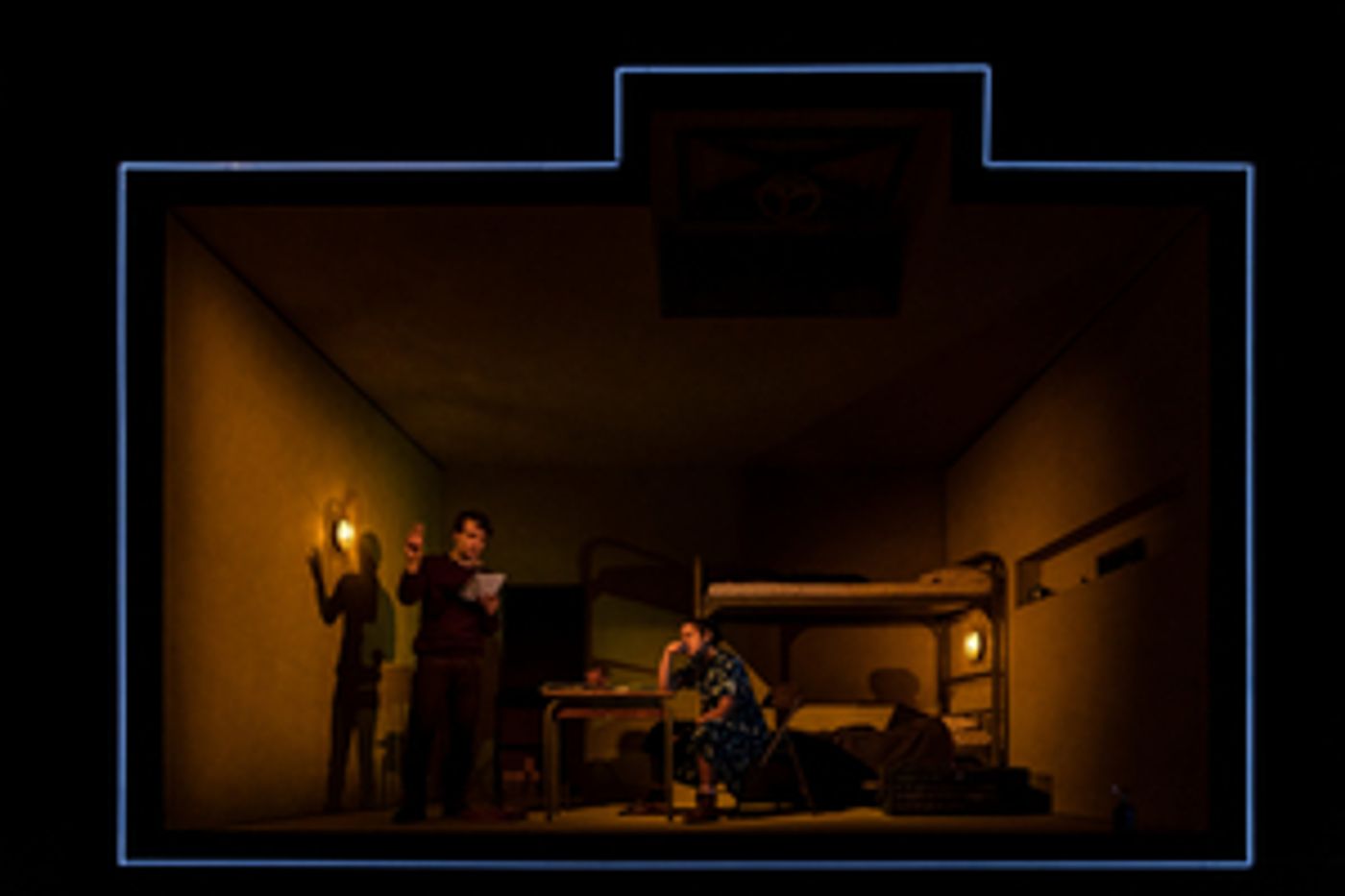Review: AFTER THE END, Theatre Royal Stratford East
Lyndsey Turner directs a jarring, visceral tale of manipulation, control, and toxic masculinity.

This review contains spoilers.
![]() The theatre gods work in mysterious ways. Right when Putin is wreaking havoc in Ukraine, threatening to start a nuclear world war, a show set in a fallout shelter opens at Theatre Royal Stratford East. Dennis Kelly's After The End is a play about power and displays scenes of spine-chilling violence - which is the main reason why the writer hasn't let many people touch it since it debuted in Edinburgh in 2005. With Lyndsey Turner at the helm, the project is a justly jarring, visceral tale of manipulation, control, and toxic masculinity.
The theatre gods work in mysterious ways. Right when Putin is wreaking havoc in Ukraine, threatening to start a nuclear world war, a show set in a fallout shelter opens at Theatre Royal Stratford East. Dennis Kelly's After The End is a play about power and displays scenes of spine-chilling violence - which is the main reason why the writer hasn't let many people touch it since it debuted in Edinburgh in 2005. With Lyndsey Turner at the helm, the project is a justly jarring, visceral tale of manipulation, control, and toxic masculinity.
Louise (Amaka Okafor) wakes up to find herself in a bunker with her nerdy colleague Mark (Nick Blood), who claims he's saved her from a nuclear explosion. But did he really? A Schrödingerian dilemma ensues. Equipped with two weeks' worth of sustenance (for one person only) and no way of contacting anyone outside, she needs to adapt quickly and learn how to survive him more than the blast itself. Starting from its intriguing promotional photo and down to the devastating performances, it's an exceptional production.
While Mark's unthreatening virility might seem quite adorable at the beginning, his character swiftly starts showing incel vibes. Clockwork banter rapidly gives way to Louise's nervous laughter, and red flags are immediately hoisted high. She picks up on his intentions before he has the chance to consider the possibilities, and Louise's fears echoe those of every woman who's ever been left alone with an unpredictable man. Her female inclinations (or is it self-preservation?) to make creepy men comfortable even when we are in distress prevail, and she humours him. Blood and Okafor are exquisite.
Turner weaves tension into every unsuspecting exchange, expanding the silences and assembling a cast that sparkle with chemistry in spite of the alarming relationship shared by their characters. Okafor is level-headed and composed; her Louise doesn't waste her breath, opting to treat Mark rather like a wild animal or a tantrum-prone toddler. Blood is astonishing in his portrayal of Mark. He is logorrheic, a child who's just learnt to speak properly and won't shut up as he overdoes the acts of perceived kindness in this fantasy of his.
His character's violent instincts are muffled by his social ineptitude and hindered by the knowledge of being considered the joke of the office, so his psychopathic tendencies creep out slowly. He is in love with Louise, he says, and yet he creates a whole system of punishment and willingly starves her "For [her] own good". It's terrifying. Especially because it's not a situation as outlandish as it seems at first sight.
While she finds the circumstances strange, Mark has hardly given her reasons to doubt his earnestness. So, when she is suddenly locked underground thinking the world is ending outside, she trusts the man. Even when he starts irrationally exploding with rage and violence, the possibility that he is telling the truth remains valid in her eyes until letting "an avalanche of radioactive dust" into the shelter seems a better option than being trapped with him.
Peter McKintosh's set is suffocating under Tim Lutkin's suffused artificial yellow lighting, but feels far from claustrophobic with Turner's balletic direction. Eventually, when the bunker transforms into a visitation room (after one of the seemingly never-ending blackouts; the scene changes being are the only slight flaw in an otherwise spotless show), it's like a switch has been flipped. Turner twists the visuals to match Kelly's change in the core of the characters. Where Mark was wearing a barn red jumper and khakis, Louise now wears a burgundy suit; and where she was in florals on navy, he is now sporting a blue tracksuit. Mark's garrulity becomes Louise's lashes of verbal unloading, and her initial restraint turns into his eventual subduedness.
The detailing in the production is truly impressive. The most startling element of it all is that, at the end of it, after all the horrible things Mark's done, we still feel a little bit sorry for him as he sheepishly listens to Louise. This is not only a testament to the performances, but to Turner's tremendous work too. There are many ways to do this play wrong, and she avoids them all. The plot is - if you're the mistrustful kind - foreseeable; but the chance (or is it hope?) that Mark's not the actual unstable personality we think has us hanging on to every word and shudder at each heinous wrongdoing, hoping for redemption.
After The End runs at Theatre Royal Stratford East until 26 March.
Photo credit: The Other Richard
Reader Reviews
Videos

